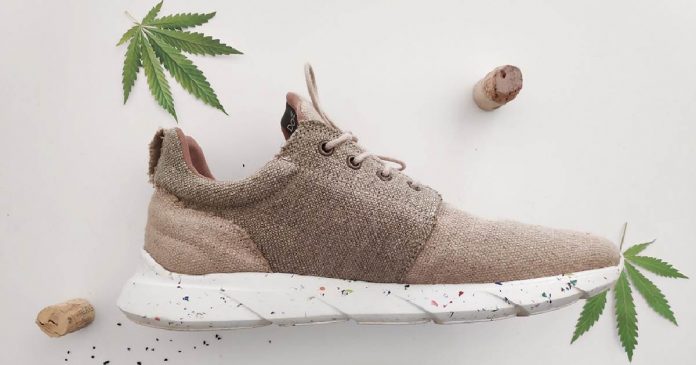Commercial production of waterproof shoes made from hemp looks good to go after a very successful crowdfunding campaign.
The Kickstarter effort for DopeKicks was looking to raise USD$10,000 to kickstart commercial production, but at the time of writing had racked up $215,000 from a total of 2,031 backers.
DopeKicks uppers are made from hemp fibre, have an outsole comprised of recycled rubber and insoles made of natural cork. Aside from the hemp aspect, the outsole is particularly interesting in that the rubber comes from old shoes. The maker of DopeKicks says one of the advantages of using natural rubber over synthetic materials such as EVA is rubber can deform and return to its original shape even after years of use – and it states these shoes have been designed to offer that.
Touted as being “100% vegan” and “100% waterproof”, DopeKicks are being made in Portugal under “fair trade” principles. A couple of days ago, the company announced 2,000 square meters of special hemp material was on its way to Portugal.
“Hemp is a super material that is stronger, more ecological, soil friendly, environmental friendly and we even made it waterproof. It took months to find the right hemp suppliers that understood our vision and that could help us pull this off, but we did it and DopeKicks was born.”
The fabric is treated with a special coating to help protect it from stains, liquids and dust particles – but details of the agent used to protect the shoes isn’t provided on the crowdfunding campaign page.
Although name chosen for the sneakers is a little disappointing (the association with marijuana, a different plant – but it’s also slang for something that’s very good), it certainly hasn’t put people off.
Hemp fabrics have come a long way over the years. There’s a lot to like about hemp fabric as it is more absorbent, durable and better insulating than cotton. It’s also a lot less thirsty than cotton, which requires an estimated 9.75 litres per kg to grow, compared to hemp’s 2.12 litres.
Among the other benefits of hemp fabrics are they have anti-bacterial products (a particularly good thing for shoes) and are mildew and mold resistant.
Part of the reason hemp was banned is attributed to the paper and cotton industry, which saw it as a threat. If prohibition hadn’t occurred, today’s clothing industry may have looked very different.
Learn more about hemp fiber and fabric production.


